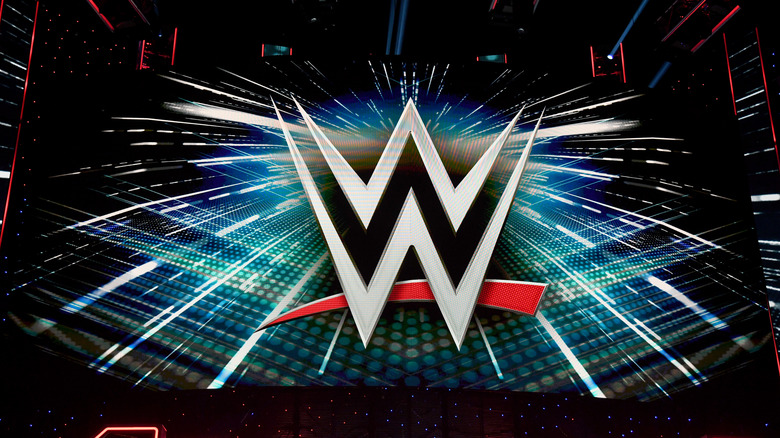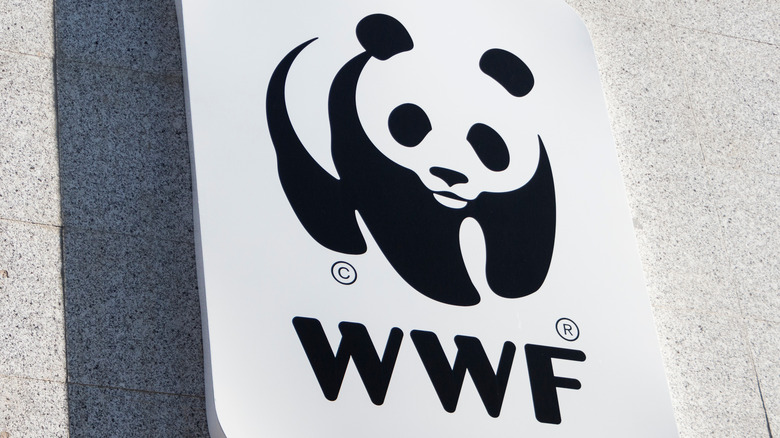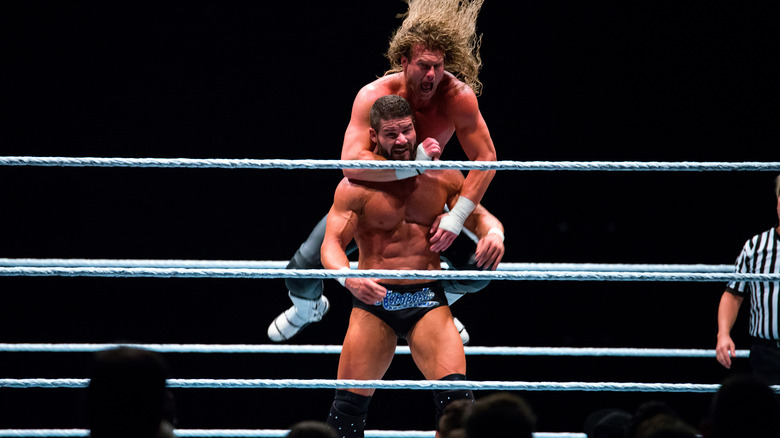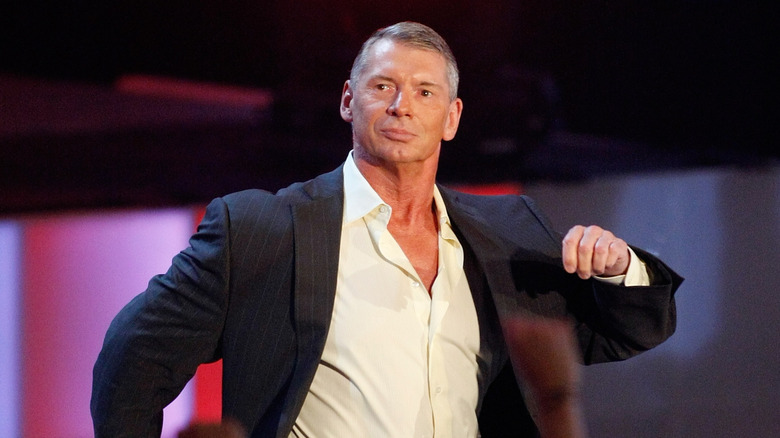How The World Wildlife Fund Forced The WWE To Change Its Name
Few things are as valuable to a business or an organization as their name. It's one of the biggest parts of creating a brand that people the world over will instantly recognize. But what happens if two completely different entities, operating in completely different fields and with entirely different missions, have the same name? Or at least, the same initials?
This was the case in the early 2000s when there were two WWFs operating globally at the same time. One WWF was the World Wrestling Federation, the Vince McMahon-helmed sports entertainment enterprise that provided a springboard for the careers of such personalities as Hulk Hogan, Ric Flair, "Stone Cold" Steve Austin, and Dwayne "The Rock" Johnson. Meanwhile, the other WWF was the World Wildlife Fund, a charity that, according to its own website, is the world's leading conservation organization, represented by its famous panda logo.
The two organizations coexisted for several decades, but by 2002, there were no longer two WWFs, as the World Wrestling Federation rebranded as World Wrestling Entertainment. According to McMahon, this had absolutely nothing to do with a lawsuit brought against his company by the World Wildlife Fund (via Forbes).
The early days of the World Wildlife Fund
The 1960s were a major decade for the conservation and environmental movements, and the World Wildlife Fund came along right at the beginning. The WWF was founded in 1961, inspired by articles that appeared in United Kingdom newspapers penned by Sir Julian Huxley that discussed issues that were taking place in East Africa pertaining to the loss of both habitat and wildlife. According to Britannica, Huxley was a biologist (and the brother of Aldous Huxley, author of "Brave New World") who was a major influence on several facets of his field, including embryology, behavioral studies, and evolution. Sir Julian went on to become one of the WWF's founding members.
Another one of the founders was Max Nicholson, who at the time was the Director General of Britain's government agency known as the Nature Conservancy. One of the appeals of setting up an international organization tasked with funding conservation was that the International Union for Conservation of Nature, or IUCN, was facing financial difficulties. The WWF moved into the IUCN's headquarters in Switzerland later in 1961 with H.R.H. Prince Bernhard of the Netherlands selected as the WWF's first president.
The CWC becomes the WWWF becomes the WWF
The other WWF — the wrestling one — can trace its roots back to the early 1950s, when Jess McMahon teamed up with wrestler Toots Mondt to create the Capitol Wrestling Corporation, or CWC. The CWC was part of a larger organization known as the National Wrestling Alliance, or NWA, per Sportskeeda. Just one year after their promotion was formed, Jess McMahon died and his son, Vince J. McMahon took his spot (via Bleacher Report). CWC started as a regional wrestling promotion based in the northeastern United States, primarily in New York and Connecticut. By 1963, the CWC split from the NWA and rebranded itself as national promotion called the World Wide Wrestling Federation or WWWF.
Through the 1960s and 1970s, the promotion continued to be known as the WWWF until its name was changed by dropping the superfluous second W, shortening the name to the World Wrestling Federation in 1979. In 1982, Vince K. McMahon purchased the entire company and made it into the massive, multi-billion dollar company that it is today, and put it on a legal crash course with the other WWF.
The lawsuit
According to Linda McMahon, Vince McMahon's wife and the WWF's then-chief executive, the Worldlife Fund made no objections when the World Wrestling Federation filed its paperwork in the early 1980s, per The New York Times. However, as the wrestling promotion's popularity increased — and, according to Forbes, as a series of sexual harassment and abuse scandals came to light in the early 1990s — it started to ruffle the other WWF's feathers. The World Wildlife Fund filed an injunction against the World Wrestling Federation in 1993, and threatened to litigate in other countries as well.
In 1994, the two sides agreed that the World Wrestling Federation would limit its use of the initials "WWF." However, the wrestling outfit didn't follow this agreement, which led to the World Wildlife Fund filing a lawsuit in the United Kingdom. The World Wrestling Federation argued that there was no reason to believe that anyone had been confused by the two organizations sharing similar names and that what the two sides had agreed to in the mid-'90s was limiting World Wrestling Federation's right to commercial freedom. According to The Guardian, the judge ruled in favor of the World Wildlife Fund, saying that the World Wrestling Federation had repeatedly breached the original agreement.
The aftermath of the lawsuit
According to The Guardian, the World Wrestling Federation argued that despite losing the court case against the World Wildlife Fund — the last WWF standing — they should have been able to hang on to the initials for their logos and their website domains. The judge didn't agree and told them that they should have been well aware of the potential fallout from continuing to use the WWF initials. The company estimated that a rebranding would cost them £35 million in 2002. This would be around £55 million today, or $68.75 million.
However, they had no choice, and the company's name was changed to World Wrestling Entertainment, or WWE. While the company would have no doubt preferred to have kept its former name, in some ways it made sense. By this point, the company had expanded beyond being a wrestling promotion into being more of a media company, with the word "entertainment" helping to encapsulate their more diverse offerings.
McMahon's spin
Anyone who has any familiarity with the WWE's head honcho Vince McMahon knows that he's not the type of guy to disappear quietly into the night after suffering a defeat, especially when that defeat came in court at the hands of an organization whose mascot is a cuddly panda. According to Forbes, in 2020, the WWE released a documentary series titled "Ruthless Aggression" that chronicled the history of the company in the 2000s. Of course, this period of the WWE's history would need to include at least some kind of mention of the name change, and it did, albeit a revisionist history of the situation.
"I believe there's gonna be a tidal wave from an attitudinal standpoint, from a creative direction standpoint, and I think it's gonna wash away a lot of our ills," McMahon said in the documentary. "And I can't exactly put my finger on it, but nor can I specifically articulate it to you at the moment, but I just know it's on its way." While that's not really the reason why they changed the name, maybe it was McMahon trying to make lemonade out of the entire lemon grove the WWE was handed by the only remaining WWF.





